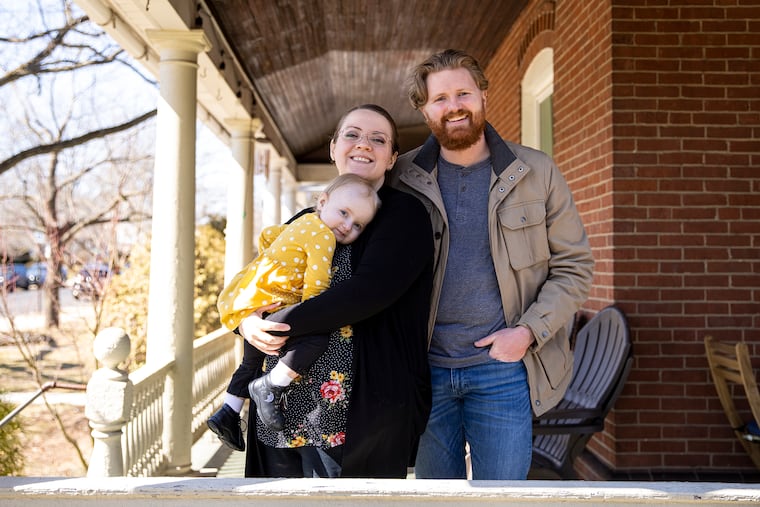This family almost — almost — threw away money from the Treasury Department for their baby’s college education
The Keystone Scholars program offers Pa. babies born after Dec. 31, 2018, and those subsequently adopted, a $100 starter deposit for future higher education expenses.

Around this time last year, Alex and Bridget Felts were very much in the throes of first-time parenthood. Their daughter Rowen, just a few months old, was the main focus of the Lansdale couple’s lives and attention back then. So they definitely didn’t worry about opening unsolicited mail. Still, one piece of correspondence somehow managed to capture Alex’s attention.
“I initially thought it was some kind of junk mail, and it was going in the trash,” admitted Alex, 36. “But I took a look at it, and it said something about a free $100 toward your [child’s] college savings account. So I took a second glance at it. It sounded too good to be true, but I filled it out.”
He and his wife are glad he did.
That almost-tossed letter was an invitation to sign up for the Pennsylvania Treasury’s Keystone Scholars program. It offers all Pennsylvania babies born after Dec. 31, 2018, and those subsequently adopted by Pennsylvania families, with a $100 starter deposit for future higher education expenses.
Now, a year later, Felts, a graphics designer, and his employer, the Einstein Healthcare Network, are part of a growing partnership between the state Treasury and care providers to let people know more effectively about this forward-thinking program.
“We’re thrilled that nearly 26,000 babies have been registered with Keystone Scholars, but that’s just over 10% of the total number of eligible babies — approximately 252,300 — so we clearly have more work to do,” said state Treasurer Stacy Garrity. “One of the best ways to spread the word is partnering with hospitals, health systems, and doctors.”
There are a lot of reasons the Treasury is sponsoring this program. For one, the agency points out, Pennsylvanians have one of the highest student loan debt loads in the country.
In addition, research has found that children from low- to moderate-income families with even very modest education savings are three times more likely to enroll in college and four times more likely to graduate than children with no savings account.
Research has also linked having child saving accounts with reduced maternal depression, better parent-child interactions, and improved social-emotional development in children. These effects are even more pronounced among low-income families.
Despite the state’s efforts to educate citizens by mail and media about the program, the information had often eluded residents, said Judith Faust, administrator of the Women’s and Children’s Department at Einstein, which formed the Keystone Scholars partnership with the Treasury in late 2020.
“If they don’t know anything about the program, people are often skeptical: ‘Should I open this? Should I give them the information they’re asking about my child?’” Faust said. “It’s really been a big surprise to our families to hear they have this available.”
The health-care system embarked on wide-ranging training about the program with staff — including doctors, nurses, social workers, and office staff — to get information about it to families before the babies are even born. Pediatric staff were also trained, because letters from the Treasury about the program usually aren’t mailed to families until the babies are about 4 to 5 months old, which is when Treasury receives birth-certificate information.
When families enroll in the program, the funds are kept in a Keystone Scholars account. To access the money for educational use by children between ages 18 and 29, the family must open a separate PA 529 College and Career Saving Program account.
The Treasury estimates that if families save just $25 per month from birth until their child is 18, their investment could grow to about $10,000.
With about 5,000 babies born each year between Einstein Medical Center Philadelphia and Einstein Medical Center Montgomery, that’s a lot of potential Keystone Scholars. In Southeastern Pennsylvania, the Treasury is also partnering with Temple Health System, Jefferson Health, and Main Line Health.
The $100 Keystone Scholars money inspired Alex and Bridget Felts to start saving early for Rowen’s education. They opened a PA529 account that they contribute to monthly; Rowen’s grandparents have kicked in, as well.
Granted, college is a long way off for the child.
Even so, her dad already has an idea where he’d like her to go.
“I went to Penn State,” the former film and video major said. “I loved my Penn State experience. I’m a big Penn State fan. I joke that she has to go to Penn State, but I know that’s not the case. Whatever she wants to do will probably be fine.” (Note the “probably.”)
Alex even proposed to his wife Bridget, 34, at the Nittany Lion Shrine, even though she didn’t attend the university.
“I was thinking with the proposal, I could indoctrinate my wife to have the connection so she’s not sick of going there,” he said.
If Rowen goes, they’ll have even more excuses to visit. And with Keystone Scholars, they’re already working on being able to pay for it.